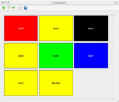|
|
Software |
StoryWeaver
$29.95

A step by
step approach to story development, from concept to completed story for
your novel or screenplay. More than 200 interactive Story Cards guide
you through the entire process.
Details
and Demo
Dramatica
$149.95

The most
powerful story structuring software available, Dramatica is driven by a
patented "Story Engine" that cross-references your dramatic
choices to ensure a perfect structure.
Details
and Demo
Movie
Magic Screenwriter
$149.95

The most
advanced screenwriting software available, Movie Magic is deemed a
"preferred file format" by the Writer's Guild. An industry
standard, MMS is used by professionals and studios around the world.
Details
and Demo
Throughline
Index Cards
$9.95

Interactive
index cards - Name them, add notes, titles, colors, click and drag to
re-arrange, adjust font, save, export and print. An essential tool for
every writer.
Details
Academic
Discounts
on Select Products

Are you a
student, teacher, or academic staffer? Get the very best price on select
products with these manufacturer sponsored academic discounts!
Details

|
| |
Chapter 22
Storytelling and Plot Dynamics
Plot Dynamic
Plot Dynamics Examples
Story Work
Action Stories: Hamlet; The Silence of the Lambs; Being There; A
Christmas Carol; Rain Man
Decision Stories: The Verdict; Chinatown; The Glass Menagerie; Casablanca;
The Godfather; The Story of Job; Charlotte's Web; A Doll's House
Story Limit
Optionlock Stories: Hamlet; The Silence of the Lambs; Being There;
The Verdict; Chinatown; The Glass Menagerie; Casablanca; The
Godfather; The Story of Job; Rain Man; A Doll's House
Timelock Stories: Charlotte's Web; American Graffiti; High Noon; 48
hrs; A Christmas Carol
Story Outcome
Success Stories: The Silence of the Lambs; Being There; A Christmas
Carol; The Verdict; Chinatown; Casablanca; The Godfather; The
Story of Job; Charlotte's Web
Failure Stories: Hamlet; The Glass Menagerie; Rain Man; A Doll's
House
Story Judgment
Stories with a Judgment of Good: Being There; A Christmas Carol; The
Verdict; Casablanca; Charlotte's Web; Rain Man; A Doll's House
Stories with a Judgment of Bad: Hamlet; The Silence of the Lambs; Chinatown;
The Godfather; The Glass Menagerie
Work: Action or Decision?
Action or Decision describes how the story is driven forward. The question is: Do
Actions precipitate Decisions or vice versa?
At the end of a story there will be an essential need for an Action to be taken and a
Decision to be made. However, one of them will be the roadblock that must be removed first
in order to enable the other. This causal relationship is felt throughout the story where
either Actions would never happen on their own, except that Decisions keep forcing them,
or Decisions would never be made except that Actions leave no other choice than to decide.
In fact, the "inciting event" that causes the story's Problem in the first place
will also match the kind of Work that will be required to resolve it. This
"bookends" a story so that its Problem and solution are both precipitated by the
same kind of Work: Action or Decision.
Stories contain both Action and Decision. Choosing one does not exclude the other. It
merely gives preference to one over the other. Do Actions precipitate Decisions, or do
Decisions precipitate Actions?
This preference can be enhanced or nearly balanced out by other dynamic questions you
answer about your story. It's really a matter of the background against which you want
your Main Character to operate.
The choice of background does not have to reflect the nature of the Main Character. In
fact, some very interesting dramatic potentials can be created when they do not match.
For example, a Main Character of action (called a Do-er) forced by circumstance to handle
a deliberation-type problem would find himself at a loss for the experience and tools he
needs to do the job.
Similarly, a deliberating Main Character (called a Be-er) would find himself whipped into
a turmoil if forced to resolve a problem requiring action.
These mixed stories appear everywhere from tragedy to comedy and can add an extra
dimension to an otherwise one-sided argument.
Since a story has both Actions and Decisions, it is really a question of which an author
wants to come first: chicken or egg? By selecting one over the other, you instruct
Dramatica to establish a causal order between dynamic movements in the Action line and the
Decision line.
Limit : Timelock or Optionlock?
Limit determines the kind of constraints which will ultimately bring a story to a
conclusion.
For an audience, a story's limit adds dramatic tension as they wonder if the characters
will accomplish the story's goal. In addition, the limit forces a Main Character to end
his deliberations and Change or Remain Steadfast.
Sometimes stories end because of a time limit. Other times they draw to a conclusion
because all options have been exhausted. Running out of time is accomplished by a
Timelock; running out of options is accomplished by an Optionlock.
Both of these means of limiting the story and forcing the Main Character to decide are
felt from early on in the story and get stronger until the moment of truth.
Optionlocks need not be claustrophobic so much as that they provide limited pieces with
which to solve the Problem. They limit the scope of the Problem and its potential
solutions.
Timelocks need not be hurried so much as they limit the interval during which something
can happen. Timelocks determine the duration of the growth of the Problem and the search
for solutions.
Choosing a Timelock or an Optionlock has a tremendous impact on the nature of the tension
the audience will feel as the story progresses toward its climax.
A Timelock tends to take a single point of view and slowly fragment it until many things
are going on at once.
An Optionlock tends to take many pieces of the puzzle and bring them all together at the
end.
A Timelock raises tension by dividing attention, and an Optionlock raises tension by
focusing it. Timelocks increase tension by bringing a single thing closer to being an
immediate problem, Optionlocks increase tension by building a single thing that becomes a
functioning problem.
One cannot look just to the climax to determine if a Timelock or Optionlock is in effect.
Indeed, both Time and Option locks may be tagged on at the end to increase tension.
A better way to gauge which is at work is to look at the nature of the obstacles thrown in
the path of the Protagonist or Main Character. If the obstacles are primarily delays, a
Timelock is in effect; if the obstacles are caused by missing essential parts, an
Optionlock is in effect.
An author may feel more comfortable building tension by delays or building tension by
missing pieces. Choose the kind of lock most meaningful for you.
Outcome: Success or Failure?
Although it can be tempered by degree, Success or Failure is easily determined by
seeing whether or not the Objective Characters achieve what they set out to achieve at the
beginning of the story.
Certainly, the Objective Characters may learn they really don't want what they thought
they did, and in the end not go for it. Even though they have grown, this is considered a
Failure -- they did not achieve what they originally intended.
Similarly, they may actually achieve what they wanted, and even though they find it
unfulfilling or unsatisfying, it must be said they succeeded.
The point here is not to pass a value judgment on the worth of their Success or Failure,
but simply to determine if the Objective Characters actually did succeed or fail in the
attempt to achieve what they set out to achieve at the beginning of the story.
Judgment: Good or Bad?
Judgment determines whether or not the Main Character resolves his personal angst.
The rational argument of a story deals with practicality: does the kind of approach taken
lead to Success or Failure in the endeavor. In contrast, the passionate argument of a
story deals with fulfillment: does the Main Character find peace at the end of his
journey?
If you want an upper story, you will want Success in the Objective Story and a
Judgment of Good in the Objective Story.
If you want a tragedy, you will want the objective effort to fail, and the subjective
journey to end badly as well.
Life is often made of trade-offs, compromises, sacrifices, and re-evaluations, and so
should be stories. Choosing Success/Bad stories or Failure/Good stories opens the door to
these alternatives.
If we choose a Failure/Good story, we can imagine a Main Character who realizes he had
been fooled into trying to achieve an unworthy Goal and discovers his mistake in time, or
a Main Character who discovers something more important to him personally in the course of
trying to achieve the Goal. Each of these would be called a "personal triumph."
A Success/Bad story might end with a Main Character achieving his dreams only to find they
are meaningless, or Main Character who makes a sacrifice for the success of others but
ends up bitter and vindictive. Each of these would be a "personal tragedy."
Because Success and Failure are measurements of how well specific requirements have been
met, they are by nature objective. In contrast, Good and Bad are subjective value
Judgments based on an appreciation of the Main Character's personal fulfillment.
Proceed
to the Next Section of the Book-->
How to Order Dramatica:
A New Theory of Story
Back to
the Table of Contents
Back to the Dramatica Home Page
Copyright 1996, Screenplay Systems, Inc.
The Dramatica theory was developed by
Melanie Anne Phillips and Chris Huntley
Chief Architect of the Dramatica software is Stephen
Greenfield
Dramatica is a registered trademark of Screenplay Systems Incorporated
Visit
the Dramatica Theory Home Page
Try Dramatica & StoryWeaver Risk
Free*

$179.95
$29.95
*Try either or both for 90 days. Not working for you?
Return for a full refund of your purchase price!
About Dramatica and
StoryWeaver
Hi, I'm Melanie Anne Phillips,
creator of StoryWeaver,
co-creator of Dramatica
and owner of Storymind.com. If you have a moment, I'd like to tell you
about these two story development tools - what each is designed to do, how
each works alone on a different part of story development and how they can be
used together to cover the entire process from concept to completion of your
novel or screenplay.
What They Do
Dramatica is a tool to help you
build a perfect story structure. StoryWeaver is a tool to help you build
your story's world. Dramatica focuses on the underlying logic of your
story, making sure there are no holes or inconsistencies. StoryWeaver
focuses on the creative process, boosting your inspiration and guiding it to add
depth, detail and passion to your story.
How They Do It
Dramatica has the world's only
patented interactive Story Engine™ which cross-references your answers to
questions about your dramatic intent, then finds any weaknesses in your
structure and even suggests the best ways to strengthen them.
StoryWeaver uses a revolutionary new
creative format as you follow more than 200 Story Cards™ step by step through
the story development process. You'll design the people who'll inhabit
your story's world, what happens to them, and what it all means.
How They Work
Together
By itself Dramatic appeals to
structural writers who like to work out all the details of their stories
logically before they write a word. By itself, StoryWeaver appeals to
intuitive writers who like to follow their Muse and develop their stories as
they go.
But, the finished work of a
structural writer can often lack passion, which is where StoryWeaver can help.
And the finished work of an intuitive writer can often lack direction, which is
where Dramatica can help.
So, while each kind of writer will
find one program or the other the most initially appealing, both kinds of
writers can benefit from both programs.
Try Both Programs
Risk Free!
We have a 90
Day Return Policy here at Storymind. Try either or both of these
products and if you aren't completely satisfied we'll cheerfully refund your
purchase price.
Our
Complete Catalog of Products
|

Get
the Writer's Survival Kit Bonus Package
FREE with ANY purchase!
A $300 Value!
|
 |
StoryWeaver
- $29.95
Our
Bestseller! A
step by step approach to story development, from concept to completed
story for your novel or screenplay. More than 200 interactive
Story Cards guide you through the entire process.
|
 |
Dramatica
Pro - $179.95
Includes
2 Exclusive Bonuses! The
most powerful story structuring software available, Dramatica is driven
by a patented "Story Engine" that cross-references your
dramatic choices to ensure a perfect structure.
|
 |
Dramatica
Writer's DreamKit - $49.95
Little
brother to Dramatica Pro, Writer's DreamKit is built around the same
patented Story Engine - it just tracks fewer story points. So, you
develop the same solid story structure, just with fewer details.
Perfect for beginning writers or those new to Dramatica.
|
 |
Power
Structure - $149.95
An
all-in-one writing environment with built-in word processor that helps
you organize and cross-reference your story development materials.
INCLUDES DVD SET BONUS!
|
|

|
Power
Writer - $99.95
The little
brother of Power Structure includes the essential organization and word
processing tools writers need the most.
|
 |
Throughline
- Index Cards (Mac) - $19.95
Interactive
index cards - add notes, titles, colors, click and drag to re-arrange.
An essential tool for every writer.
|
 |
Movie
Magic Screenwriter - $149.95
The most
advanced screenwriting software available, Movie Magic is deemed a
"preferred file format" by the Writer's Guild. An
industry standard, MMS is used by professionals and studios around the
world.
|
|

|
Final
Draft - $199.95
Like Movie
Magic Screenwriter, Final Draft is an industry standard, used by many
professional screenwriters and studios around the world.
|
 |
Between
The Lines (Macintosh) - $29.95
The lowest
cost automatic screenplay formatter for Macintosh includes high-end
features such as interactive index cards linked to your script.
|
|

|
 |
12
Hour Writing Course - $19.95
Everything
you need to know about story structure - twelve hours of video on a
single DVD - presented by Dramatica Theory co-creator, Melanie Anne
Phillips.
|
 |
Dramatica
Software Companion - $19.95
More than
four hours of video demonstrations of every key feature in Dramatica,
narrated by the co-creator of Dramatica.
|
 |
StoryWeaving
Tips Book - $19.95
170 pages of
eye-opening essays on story structure, storytelling, finding inspiration
and a wide variety of writing techniques.
|
 |
StoryWeaving
Seminar 8 DVD Set - $99.95
14 hours of
video from a live two day course taught by theory co-creator Melanie
Anne Phillips covering Dramatica story structure and StoryWeaver
storytelling.
|
 |
StoryWeaving
Seminar Online - $49.95
The same 14
hour program presented in streaming video that you can view online or
download for a permanent copy.
|
 |
Dramatica
Theory 2 Hour Audio Program - $19.95
Every key
concept in the Dramatica Theory of Story is fully explained in this
double-CD set.
|
|

|
Writing
Characters of the Opposite Sex - $29.95
A three-hour
audio CD set that explains everything you need to know to create
characters of both sexes that ring absolutely true (and maybe even gain
insight into the communication problems in the real world!)
|
 |
Master
Storyteller Improves Your Writing - $29.95
Become a
better writing with this series of interactive exercises.
|
|

|
How
to Create Great Characters DVD - $19.95
A 90 minute
video program recorded during Dramatica co-creator Melanie Anne
Phillips' live in-person seminar on story structure and storytelling.
|
|

|
Structure
vs. Passion - Audio CD $19.95
The Story
Mind approach to writing uses your own passions to create your story's
structure. It focuses your efforts, clarifies the direction of
your story, and triggers your imagination.
|
|

|
Writing
with the Story Mind - Audio CD - $19.95
Learn how to
psychoanalyze your story's "mind" to uncover and treat
problems with characters, plot, theme, and genre.
|
|

|
|

|
Academic
Prices - Discounts on Select Products
Are you a
student, teacher, or academic staffer? Get the very best price on
select products with these manufacturer sponsored academic discounts!
|
|

|
Package
Deals - Starting at $49.95
Get deep
discounts with these bundles of our most popular writing products.
|
|

|
Writer's
Survival Kit Bonus Package - FREE!
Free with
ANY purchase - Writing software, online writing workshops, writing
seminars on video, story theory book, and much, MUCH more!
|
| |
|